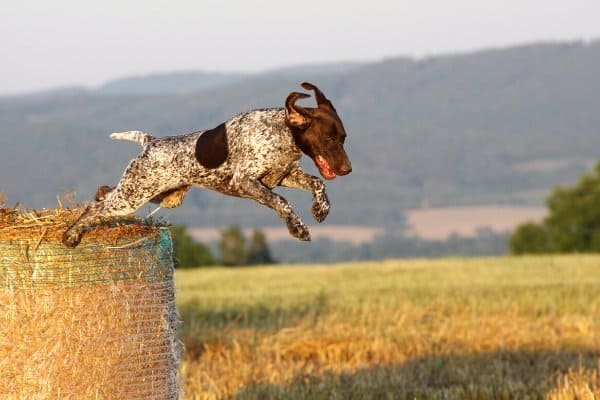Why is my German Shorthaired Pointer so skinny? Are you worried that your German Shorthaired Pointer is too thin, regardless of how much you feed him?
Many GSP owners are concerned about their dog’s weight, but most people have nothing to worry about.
Many German Shorthaired Pointers naturally appear lean due to their body structure but are actually considered normal according to the breed standard. GSPs who are indeed too thin may not be being fed an appropriate diet for their lifestyle.
If you’re worried that your GSP is too skinny and are wondering how to put more weight on your dog, read on to find out what the ideal weight is and what you can do if your dog is indeed underweight.
Is My German Shorthaired Pointer Too Skinny?
Are you worried that your GSP isn’t carrying enough weight and may not be getting as much nutrition as he needs?
The first thing that you should do is learn exactly what your GSP should look like and how this breed typically behaves.
German Shorthaired Pointer Breed Standard
If you think that your German Shorthaired Pointer is too skinny, check out the breed standard and look at the dogs who are winning in show rings.
The GSP will do better in the ring if he is in hard-and-lean field condition. These dogs should have no excess fat, but they should be well muscled.
When a GSP is in prime condition, you should be able to see the ribs’ outlines along the flank, and there should be a decided tuck at the abdomen.
As long as the muscles are well defined and the coat is shiny, a lean GSP is unlikely to be too skinny or undernourished.
Exercise Burns Off Fat
The GSP is one of the most high-energy dogs in existence.
These dogs are happiest when they are in motion, preferably running outside at full speed.
They are delighted to run through the snow or swim for hours in a body of water.
If there is something for your German Shorthaired Pointer to be doing actively, you can bet that he’ll be doing it.
Such an active lifestyle is very effective for burning off fat and calories.
The average GSP is intense enough that it is almost impossible to keep any kind of extra weight on the lean muscled body.
This is how the dog is supposed to be and should not cause any kind of concern.
Working Dogs Exercise Even Harder
Working dogs who are actively hunting in the field for at least several days a week are likely to burn off even a very rich diet.
For every step that a hunter takes, the pointer does many laps, so every hunt results in substantial exercise for the dog.
When you take into consideration that hunts are often conducted over lots of obstacles and water, you’ll realize that your GSP is getting an extreme workout.
Expect your working GSP to appear lean muscled and skinny, especially during the hunting season.
What Should I Be Feeding My GSP?
If you’re worried that your German Shorthaired Pointer is too skinny, exercise and breed standard considered, your first concern will be his diet.
A GSP provided with a properly nutritious diet may still appear to be lean, but you can feel confident that he’s getting all of the nutrition that he needs.
Protein
The German Shorthaired Pointer is a highly active dog with well-developed muscles.
Your GSP needs plenty of protein in the diet to help him develop strong muscles and help muscles to recover after exercise.
A diet rich in protein will also help your dog develop an acute mind.
Oils
A diet too high in oils, especially a feed with oil in the first four ingredients, has been connected to bloat in dogs.
Therefore, you need to be very careful that your dog’s diet is not too rich in oils, especially unhealthy oils.
However, your GSP will benefit from a diet that is rich in healthy oils, provided there aren’t too many.
Oils from fish like salmon and healthy grains will help your GSP to develop a sleek, shiny coat.
Carbohydrates
Carbohydrates are important in your GSP’s diet to give him the energy needed to keep going all day long.
Plenty of carbohydrates keep your GSP from feeling hungry between meals and enable the muscles and brain to work well throughout even a very strenuous workday.
Avoid soybean or soybean meal, as it has been tied to bloat in dogs.
Instead, seek out healthy sources of carbohydrates like sweet potatoes, flaxseed, rice, etc.
Supplements
The GSP is a large dog that can be prone to hip and elbow problems, so it’s a good idea to supplement the diet with joint-building ingredients like glucosamine and chondroitin.
Look for a dog food that has these ingredients worked into the recipe or choose a quality supplement to give your GSP.
For more information on selecting the best dog food for your GSP, be sure to read our Ultimate Guide to the Best Dog Foods and Treats.
Treats to Help Your GSP Gain Weight
If you’re worried that your GSP is skinnier than he should be and if you’d like to develop stronger muscles in your dog, treats can help.
It’s often recommended to offer additional treats rather than feeding your dog more at mealtimes, as it may be better to get concentrated protein to help build muscles than to get more dog food.
Here are some treats that can help your GSP to gain weight in a healthy way.
Dried Fish
Whole or sliced dried fish, like minnows, cod, and salmon, are all great options to give your dog plenty of healthy oils, joint supplements like chondroitin and glucosamine, and lots of healthy protein from muscle meat.
You might not like how it makes your GSP’s breath smell, but your dog is sure to love it.
Freeze-Dried Meat
All kinds of dried meats are great high-protein snacks for your GSP.
Look for dried chicken, buffalo, duck, rabbit, etc. for delicious high-protein snacks that are easy for your GSP to digest and turn into muscle-building protein.
Tendons and Other Dried Parts
Dried animal parts such as turkey tendons, beef or venison esophagus, and bully sticks are great sources of protein and joint-building supplements.
These treats are also packed with many vitamins and minerals that are great for your dog.
As an added benefit, these treats double as a chew toy to keep your GSP entertained.
Lifestyle Changes to Help Your GSP Gain Weight
If you’re convinced that your GSP needs to gain weight, you can make some lifestyle changes to help.
German Shorthaired Pointers tend to be highly dedicated to their owners and very willing to learn, so you can incorporate changes into your lifestyle together fairly easily.
Work-to-Eat Training
In this kind of training, your dog is only fed when he accomplishes a training goal. You will feed your dog throughout the day as he accomplishes these goals.
This kind of training can help your GSP to gain weight, especially if your dog isn’t interested in eating much from a bowl.
GSPs are so happy to work for their owners that they will accept the treat as a part of the overall working experience and end up eating more than they would if you had simply put the food in a bowl.
Food Dispensing Toys
If dinner time is boring for your GSP, he may not be eating as much as he should be.
Putting food into a treat dispensing toy makes dinner time into a game, which can help your dog to be much more engaged.
Adding a few treats in with the food makes it even more exciting for your dog to keep playing.
You may find that your dog is more likely to eat his entire dinner from a food distributing toy than he would if you fed him from a bowl.
Feed After Exercise
Some GSPs refuse to finish their breakfast simply because they are more excited to go outside and play than to eat.
Feeding your dog after he is well exercised makes it more likely that he’ll actually settle down and finish his meal.





